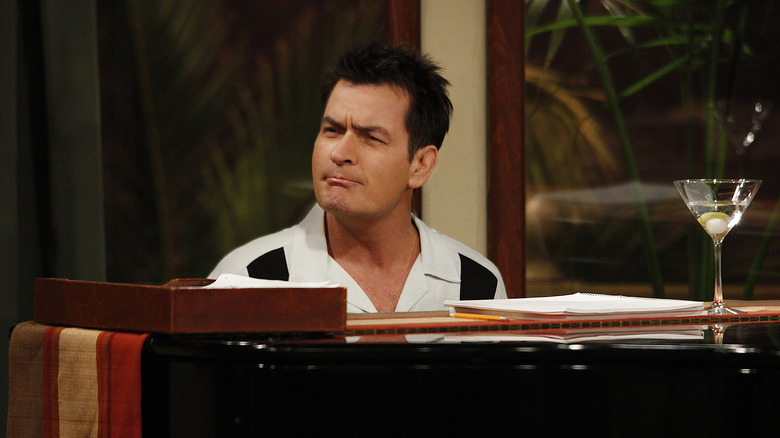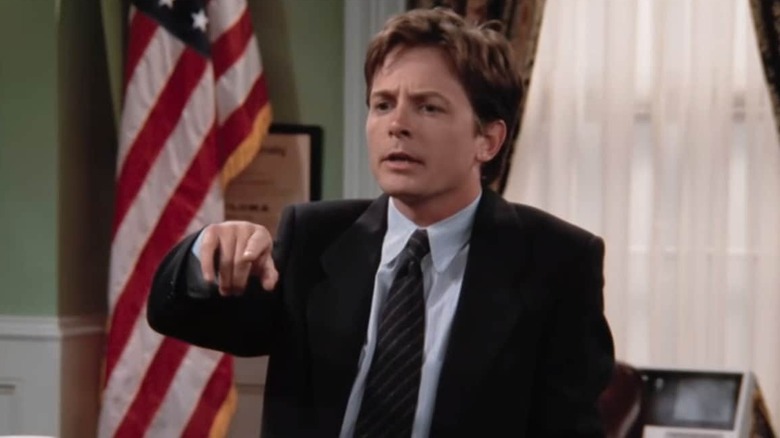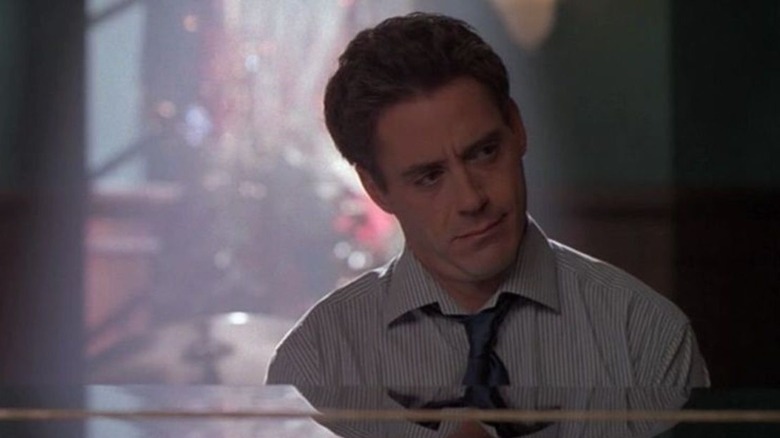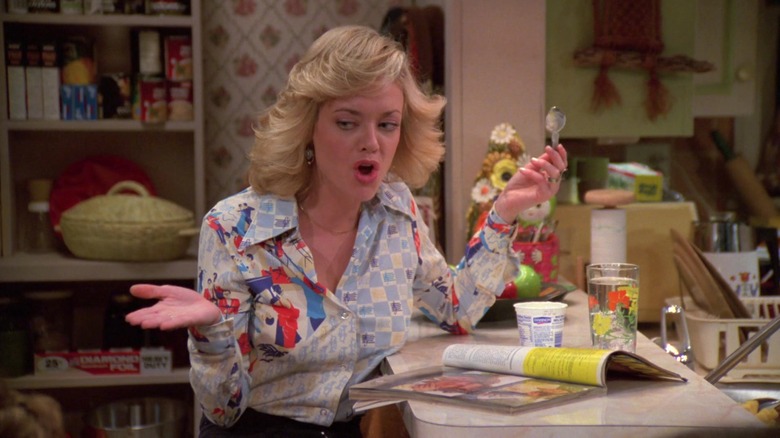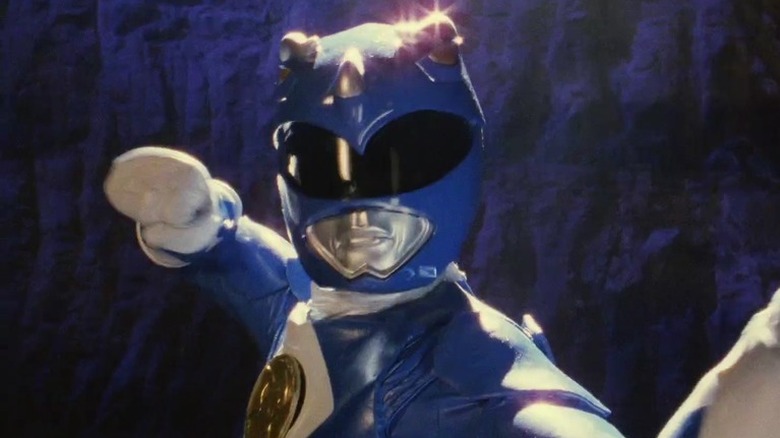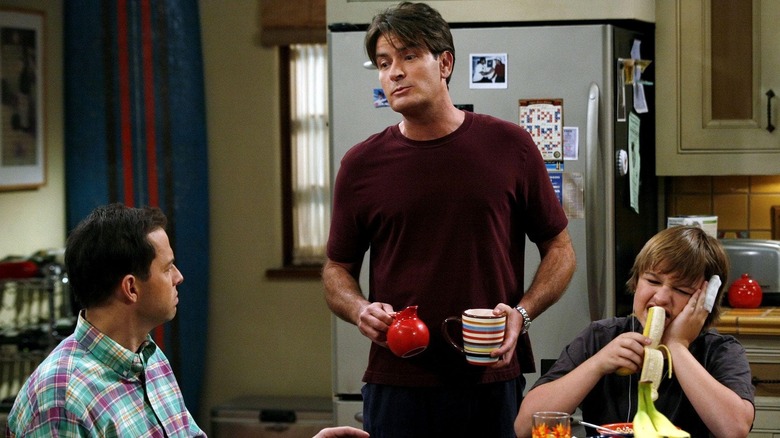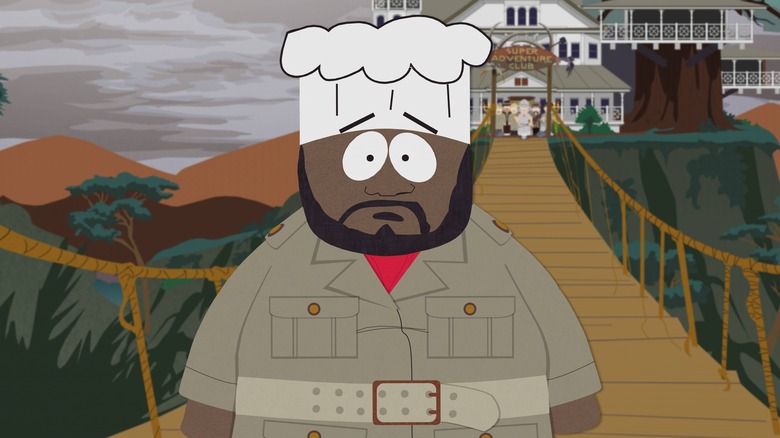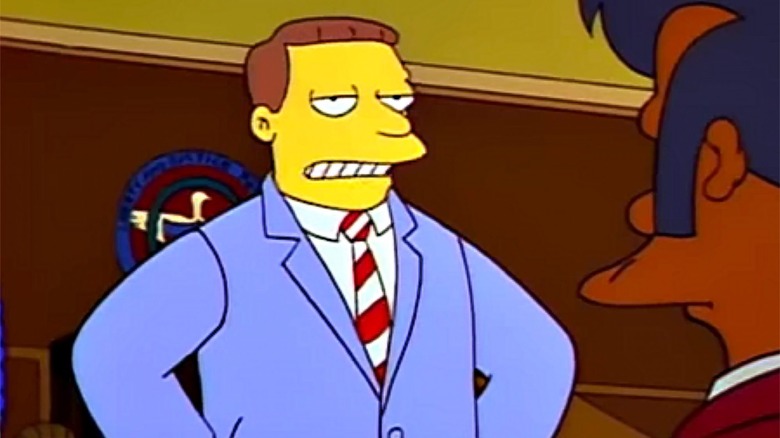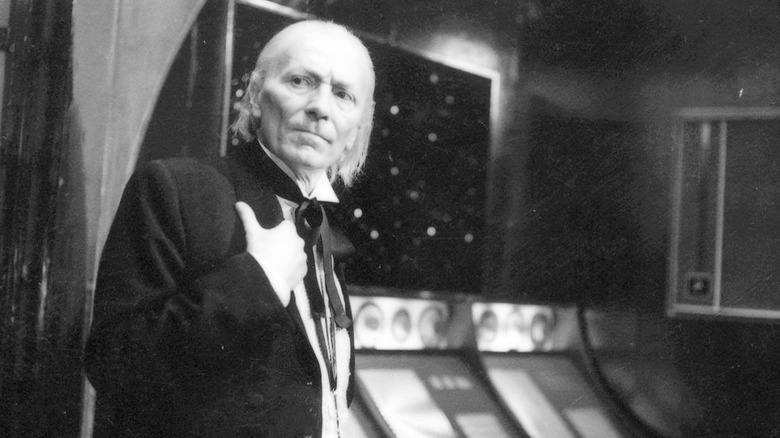Tragic Reasons These Characters Were Written Off TV Shows
By its very nature, television series span a prolonged period of time, encompassing numerous story arcs, characters, and exciting new narratives as each season draws on. The more successful the television show, the greater the chance said series will go on to garner additional seasons, whether it's a series that spans a decade, like "Friends," or perseveres over a quarter of a century, like "The Simpsons" or "South Park."
With how long certain shows turn out to be, it's safe to assume some characters might be phased out at one point or another, their character receiving a fitting conclusion that explains their departure from the series. On the flip side of the coin, there are rare times when an actor is taken off television for an entirely different reason, the circumstances of their personal lives necessitating their departure from a TV show. In some instances, these sudden exits might be due to an illness affecting the actor's performance or a debilitating substance issue they're unable to overcome.
From beloved main characters being replaced halfway through to supporting actors unceremoniously written off of their show, here are some devastating reasons why these actors were taken off of television.
Complications from Parkinson's forced Michael J. Fox to leave Spin City
In the mid-1990s, Michael J. Fox was at the height of his career. Having solidified a name for himself off the success of "Back to the Future," Fox went on to star in a number of films and TV series from the late '80s well into the new decade. He eventually secured a lead role on the ABC sitcom, "Spin City," for the show's first four seasons. Sadly, Fox's tenure on the show was cut short by a serious degenerative disease.
Right around the time "Spin City" was releasing its second season in 1998, Fox announced that he had been diagnosed with Parkinson's disease, a disorder of the central nervous system that impairs physical movement. As Fox's battle with Parkinson's continued and his symptoms grew steadily worse, he decided to step away from "Spin City," spending a larger amount of time with his loved ones in 2000. "I could not be more proud of the show ... and all that we have accomplished over the last four years, yet I feel that right now my time and energy would be better spent with my family and working toward a cure for Parkinson's disease," Fox said in a statement about his decision to leave the show.
In his place, ABC inserted Fox's successor, Charlie Sheen, who played the similarly-veined role of Charlie Crawford. After two seasons with Sheen in the lead, ABC canceled "Spin City."
Robert Downey Jr.'s relapse resulted in Larry being ousted from Ally McBeal
Before he was headlining the MCU as the sharp-witted tech billionaire Tony Stark, Robert Downey Jr. was struggling with severe personal issues, mostly related to a recurring drug addiction he'd endured since his career began in the 1980s. From 1996 until 2001, the future Iron Man actor was arrested multiple times for drug-related crimes, landing him in the California Substance Abuse Treatment Facility and State Prison for most of 1999.
Upon his release in 2000, Downey resumed his acting career, signing on to appear in a prominent role on the Fox comedy series, "Ally McBeal." His performance as Ally's love interest Larry Paul won the actor instant renown from critics, netting Downey a Golden Globe Award for best supporting actor. Just when it seemed like his career was on the mend, Downey once again found himself the subject of controversy, with Downey relapsing in late 2000. As his addiction and legal issues grew more serious, Fox opted to rewrite Downey's character out of "Ally McBeal," dismissing Downey from his contractual obligations to the series.
Some months later, Downey was ordered to enroll in an intense therapy and rehabilitation program to treat his drug addiction, helping him overcome his substance abuse issues by 2003. Since then, Downey has managed to retain his sobriety, launching a successful career resurgence from the mid-2000s onwards.
Lisa Robin Kelly's miscarriage forced That '70s Show to replace Laurie
Throughout most of "That '70s Show"'s original run, Lisa Robin Kelly portrayed Eric's promiscuous older sister, the diabolical man-eater Laurie Forman. A recurring antagonist to Eric and his friends and a principal romantic interest of Michael Kelso, Laurie appeared as a supporting character in the show's first three seasons, later returning as a special guest in Season 5. In between her appearances, it was established that Laurie had been enrolled in beauty school, disappearing from Point Place as she focused on her studies as a way to explain Kelly's absence.
Sadly, Kelly's sporadic appearances in "That '70s Show" were largely a result of her troubled personal life, with Kelly suffering a miscarriage halfway through the show's run. This traumatic event contributed to Kelly developing a serious drinking problem, which ultimately got her ousted from the series. As Kelly told ABC News in 2010, "I had lost a baby. As a result of that, I lost it. I lost everything and I was abusing alcohol."
Following her brief appearance in Season 5, Kelly was taken off television as her alcohol dependence worsened, and the network soon hired a new actor (Christina Moore) to play Laurie for the remainder of Season 6. Soon afterward, Laurie was written off of the show completely, the canonical explanation being that she had moved to Canada.
The homophobic treatment of David Yost triggered his departure from The Power Rangers
When David Yost departed from the "Power Rangers" multimedia franchise in 1996, it was originally believed that the actor had left the series as a result of unsatisfactory contract negotiations between himself and network executives. In the years since, Yost has revealed that the primary reason he decided to walk away from "Power Rangers" was almost entirely because of the homophobic treatment he endured at the hands of his colleagues.
In an interview with No Pink Spandex, Yost recalled numerous instances of being degraded for his sexual orientation throughout his tenure on "Mighty Morphin Power Rangers." As Yost remembered it, he finally walked off set after years of being mocked for his open homosexuality, the homophobic slurs causing Yost to question his self-worth and his role in the series. "Basically I just felt like I was continually being told I was not worthy of being where I am because I'm a gay person," said Yost. The constant harassment Yost experienced led the actor to consider taking his own life. To cope, Yost exited from the series, allowing him to better focus on his own mental health.
Fortunately, Yost was able to acquire the inner healing he needed, his mental health improving a short time after his withdrawal from "Power Rangers." In 2023, Yost even reprised his role as the Blue Power Ranger, Billy Cranston, in the 30th anniversary special, "Mighty Morphin Power Rangers: Once & Always."
Charlie Sheen's erratic behavior nearly derailed Two and a Half Men
Charlie Sheen is no stranger to controversy, the actor having been embroiled in a number of public scandals over the years due to his repeated issues with alcohol and illicit substances. In early 2011, these issues came to a dramatic head, with Sheen's problematic personal life ultimately affecting his performance on CBS's popular sitcom "Two and a Half Men."
For the first eight seasons of the show, Sheen played the role of womanizing professional musician, Charlie Harper, a carefree alcoholic who repeatedly clashes with his prudish brother, Alan (Jon Cryer). While Sheen's performance proved popular among fans and critics for eight years, Sheen's reported alcohol and drug use led the actor to lash out at the cast and crew. After production on the series was halted to accommodate Sheen's enrollment into a rehabilitation program, Sheen publicly called out "Two and a Half Men" showrunner Chuck Lorre in a letter to TMZ, referring to him as a "little maggot" and wishing him "nothing but pain."
In response to Sheen's offensive comments, Warner Bros. terminated Sheen's contract, recasting Ashton Kutcher in the show's lead role as the lovesick tech billionaire, Walden Schmidt. To add insult to injury, Lorre also added a slew of jokes at Sheen's expense, mocking Sheen's former character in a variety of creative ways.
Isaac Hayes' entourage forced him to quit South Park
With how much "South Park" has changed since it first debuted on Comedy Central in the summer of 1997, it's easy to forget certain characters that gradually faded into obscurity from the show's earliest seasons. Among these phased-out South Park residents included none other than the prominent character of Chef, a down-to-earth cafeteria worker played by musical legend Isaac Hayes.
A dedicated "South Park" cast member from 1997 to 2006, Hayes reportedly left the series after the show's critically acclaimed Season 9 episode, "Trapped in the Closet." Initially, it was believed Hayes' departure from the series stemmed from his personal membership in the Church of Scientology, which the episode viciously attacked. In the years since the episode's release, however, Hayes' son revealed the hidden circumstances that led to his father's exit from "South Park."
In a 2016 interview with The Hollywood Reporter, Isaac Hayes III contested that his father had suffered a stroke shortly after "Trapped in the Closet" was aired, rendering him unable to speak for himself as he recuperated. In his stead, Hayes' assistants — all of whom were Scientologists — made the decision to leave "South Park" on behalf of the actor. "Isaac Hayes did not quit 'South Park'; someone quit 'South Park' for him," Hayes III said. This statement was corroborated by showrunners Trey Parker and Matt Stone, with Stone saying, "We sort of figured out the whole picture a bit later, but that's totally what happened."
Yvette Nicole Brown's personal obligations prevented her from returning to Community
While Chevy Chase's acrimonious departure tends to overshadow most other cast members' exit from the series, "Community" has seen quite a few actors come and go over the course of its six seasons. Among the faces that have walked through Greendale's doors include Chase, Donald Glover, Jonathan Banks, Keith David, and Yvette Nicole Brown, the latter of whom failed to make the jump to Yahoo! Screen when "Community" was picked up for its final season in 2015. To explain her absence, the showrunners provided an epilogue for Shirley, Brown's kindly yet passive-aggressive Greendale student. In said epilogue, it's established Shirley left the community college to care for her ailing father in Atlanta, eventually becoming the close friend and partner-in-crime of a depressed homicide detective hoping to avenge his wife's murder.
Much like her on-screen character, Brown's departure from "Community" stemmed from her commitment to her family, with Brown caring for her Alzheimer's-afflicted father as "Community" prepared for its sixth season. In 2023, Brown spoke with Salon about the backlash she received from fans because of her decision, although Brown has said that she doesn't regret her choice to step away from "Community" in the slightest. "In my mind, what kind of monster is going to choose a television show over their father?" said Brown.
Phil Hartman's murder led The Simpsons to retire his characters
Given how long "The Simpsons" has been on television, it's fair to assume a few characters within the show would be gradually phased out, especially in the wake of certain actors' deaths. As tragic as these real-world developments often are, far and away one of the most shocking deaths related to the series came with the murder of "Simpsons" voice actor Phil Hartman in 1998.
Having made a name for himself on "Saturday Night Life" in the first half of the decade, Hartman joined "The Simpsons" cast in the series' second season, voicing recurring characters like the inept lawyer Lionel Hutz and the B-movie actor Troy McClure. As memorably great as Hartman's contributions to "The Simpsons" were, his tenure on the show came to an abrupt end when Hartman was killed by his wife, Brynn, in their Los Angeles home on May 28, 1998. Upon murdering Hartman, Brynn — who had been dealing with substance addiction and poor mental health — died by suicide immediately afterward.
In response to the tragedy, Hartman's characters were retired from "The Simpsons," occasionally appearing in a non-vocal cameo in the background of a select few scenes.
The abuse of Paz de la Huerta led to her departure from Boardwalk Empire
In the world of Prohibition-era bootlegging and 1920s gangsters, Paz de la Huerta portrayed the girlfriend of corrupt Atlantic City politician Nucky Thompson on HBO's hit TV series, "Boardwalk Empire." Over the course of the first season, de la Huerta's flirtatious Lucy Danzinger tries to retain her relationship with Nucky, but grows apart from her former beau when he begins expressing romantic feelings for the Irish widow, Margaret Schroeder. As his newfound attachment to Margaret continues to grow, Nucky eventually breaks off his relationship with Lucy, sending her into an alcohol-fueled depressive spiral before her departure from the series at the end of Season 2.
In actuality, Lucy's departure from "Boardwalk Empire" came as a result of Paz de la Huerta's own worsening mental health. Shortly after the first season of "Boardwalk Empire" aired in 2010, de la Huerta admitted to having two nonconsensual sexual encounters with infamous Hollywood producer, Harvey Weinstein. The traumatic assault led to de la Huerta developing serious depression and abusing alcohol to cope. "I was very traumatized," de la Huerta told Vanity Fair. "I don't think I was taking very good care of myself. What happened with Harvey left me scarred for many years."
As her mental health and drinking worsened, HBO opted not to renew her contract after the show's second season, explaining Lucy's absence by having her abruptly flee from Atlantic City after a failed romance with Prohibition agent Nelson Van Alden.
William Hartnell's worsening health forced Doctor Who to recast their lead character
A key trait associated with "Doctor Who" has always been its ability to change over time, with the show famously casting different actors as its lead character from decade to decade. In 1966, though, the idea of recasting your main actor was unheard of, requiring a creative reason explaining the change. However, William Hartnell's rapidly declining health necessitated a new actor stepping into the role of the Doctor on "Doctor Who," with Hartnell suffering from an undiagnosed case of arteriosclerosis as the series began production in its fourth season.
In simple terms, arteriosclerosis is a vascular disease that prevents proper blood flow to the brain, affecting cognitive abilities. As Hartnell grappled with this disease, his performance as the Doctor began to suffer, and The Express reported that Hartnell had more and more trouble remembering his lines. This — coupled with Hartnell's own deteriorating working relationship with the show's production staff — led Hartnell to depart from the series, and the showrunners utilized the idea of "regeneration" to introduce Hartnell's successor, Patrick Troughton, as a replacement. Since then, the regeneration cycle has been a recurring element of "Doctor Who," with over a dozen actors inhabiting the lead role of the Doctor in the character's various incarnations.
Jennifer Lien's mental health struggles caused her to leave Star Trek: Voyager
When it first aired on UPN at the start of 1995, "Star Trek: Voyager" offered a unique spin on the traditional "Star Trek" narrative. Utilizing a slew of exciting new characters, the series focused more on the attempts of the eponymous U.S.S. Voyager to seek refuge, traveling across the Delta Quadrant in the hopes of returning home. As many entertaining characters as they were on the show, few captured viewers' attention quite like the Ocampa medical assistant, Kes.
To everyone's surprise, Kes was written out of the series as "Star Trek: Voyager" entered its fourth season, the character making her final regular appearance in the 1997 episode, "The Gift." Originally, producers cited the fact that they had troubling thinking of future storylines built around Kes. In the years since, the showrunners have alluded to the fact that Kes's actor, Jennifer Lien, suffered from poor mental health as the series drew on. "We knew that there was something going on," showrunner Jeri Taylor said in the 2020 book, "Star Trek Voyager: A Celebration." "But she wouldn't talk or let us offer to help." Without any other options, Lien was taken off "Voyager," although she later returned in the Season 6 episode, "Fury," in a guest role.
In more recent years, Lien's mental health and legal troubles only seem to have grown worse. In 2015, the former actress was arrested on two separate occasions – once for reckless endangerment and aggravated assault (among other charges), and the other for exposing herself to a group of minors.
If you or anyone you know needs help with addiction issues; may be the victim of domestic or spiritual abuse; has been a victim of sexual assault; or is struggling or in crisis, contact the relevant resources below:
- The Substance Abuse and Mental Health Services Administration website or contact SAMHSA's National Helpline at 1-800-662-HELP (4357).
- The National Domestic Violence Hotline at 1−800−799−7233. You can also find more information, resources, and support at their website.
- Visit the Rape, Abuse & Incest National Network website or contact RAINN's National Helpline at 1-800-656-HOPE (4673)
- If you or someone you know is struggling or in crisis, help is available. Call or text 988 or chat 988lifeline.org
